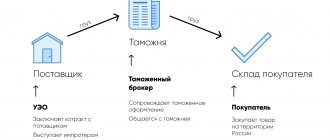An authorized economic operator is a legal entity with a special status in the foreign economic activity system. Typically, large manufacturing or trading companies receive this status to make importing products or raw materials easier and faster. To obtain this status, companies must meet certain conditions of the Customs Code.
Some customs brokers offer their clients to work through a technical importer with AEO status. This means that the customer and importer of the cargo is a partner company with the status of an authorized economic operator, which has privileges at customs. For example, the release of goods before filing a customs declaration, deferment of customs duties and lack of exchange controls.
The client purchases goods from the importer already in Russia. The AEO becomes an intermediary between business and customs authorities. For the first, it guarantees cost savings and deferred payment of customs duties; for the second, it guarantees the “purity” of imported goods.
Some brokers offer companies affiliated with us with an AEO license as a technical importer.
Which companies can obtain the status of an authorized economic operator?
A legal entity can receive an AEO certificate only if the conditions determined by customs legislation are met. This is not easy to do, since there are many conditions and they are almost impossible for small and medium-sized businesses. Only large companies with large income and a crystal clear history from a legal point of view can become an authorized economic operator.
Criteria for obtaining AEO status:
- The organization must ensure the fulfillment of obligations as an AEO financially - 1 million euros, 150 thousand euros - for exporters and manufacturers.
- Pay all customs duties on time.
- Conduct your business legally and not be held administratively liable in the field of customs affairs for a year.
- The management, founder, shareholder (with 10% or more of the company's shares), as well as the chief accountant of the organization should not have facts of criminal prosecution.
- The organization must maintain a product accounting program;
- The organization (customs representative, owner of the temporary storage warehouse) must be engaged in foreign trade activities for at least three years, and for at least two years as a customs carrier.
- The organization must not be bankrupt or in a state of reorganization.
Status may be revoked if:
- The company did not provide reports on time;
- The organization or its employees were brought to administrative responsibility; the offense affects the scope of customs affairs;
- A criminal case was opened against the leaders of an organization with AEO status (or its employees).
It turns out that the status of an authorized economic operator with a broker guarantees not only the purity of operations for customs, but also confirms the reliability of the company for clients.
The concept of “Authorized Economic Operator” (AEO) is defined by the Customs Code of the Eurasian Economic Union (EAEU Customs Code). Article 430 of this document states that the AEO is a specialized participant in the customs sphere.
Authorized economic operator: conditions for assigning status, obligations and simplification
Currently, the conditions for assigning the status of an authorized economic operator (hereinafter referred to as AEO) are established by Art. 39 of the Customs Code of the Customs Union (hereinafter referred to as the Customs Union Customs Code) and clause 3 of the Regulations on the procedure for issuing a certificate of inclusion in the register of authorized economic operators and its revocation (hereinafter referred to as the Regulations), approved. By Decree of the President of the Republic of Belarus dated July 18, 2011 No. 319 . AEO status is assigned to a legal entity by the State Customs Committee of the Republic of Belarus (hereinafter referred to as the State Customs Committee) by issuing a certificate of inclusion in the register of authorized economic operators in the manner determined by the Regulations. Review of documents is carried out within one month from the date of acceptance of the application and the documents attached to it. Based on the results of consideration of the application and the information provided, a decision is made to issue a certificate or to refuse to issue it, which is formalized by order of the Chairman of the State Customs Committee. Currently, more than 330 legal entities created in accordance with the legislation of the Republic of Belarus have AEO status.
Regulation of the procedure for assigning status and monitoring the implementation of AEO activities
The procedure for assigning AEO status to an interested person and monitoring his activities after assignment of the status is regulated by international regulatory legal acts and acts of national legislation of the Republic of Belarus, the main ones of which are: – Labor Code of the Customs Union; – Decision of the Customs Union Commission dated December 9, 2011 No. 872 “On determining criteria for persons engaged in the production of goods and (or) exporting goods to which export customs duties are not applied, applying to obtain the status of an authorized economic operator”; – Decision of the Customs Union Commission dated June 18, 2010 No. 323 “On the list of goods in respect of which special simplifications provided to an authorized economic operator cannot be applied”; – Decree of the President of the Republic of Belarus dated July 18, 2011 No. 319 “On some issues of customs regulation, on the implementation of activities in the field of customs affairs and authorized economic operators”; – Resolution of the State Customs Committee of the Republic of Belarus dated April 26, 2012 No. 11 “On the procedure for maintaining records and submitting reports for the purposes of customs control.”
Conditions for assigning status
Assignment of AEO status to a legal entity is carried out subject to the following conditions: – provision to the customs authority, in the area of operational activities of which the interested person is located, of security for the payment of customs duties and taxes in an amount equivalent to 1 million euros at the official exchange rate of the Belarusian ruble in relation to the euro established by the National by the bank on the day of provision of such security. Persons engaged in the production of goods and (or) exporting goods to which export customs duties are not applied, if these persons meet the criteria determined by the Decision of the Customs Union Commission dated 09.12.2011 No. 872, provide security for the payment of customs duties and taxes in the amount equivalent to 150,000 euros at the official exchange rate of the Belarusian ruble against the euro established by the National Bank on the day of provision of such security. The implementation of activities for the production of goods is confirmed by a certificate of own production issued by the Belarusian Chamber of Commerce and Industry. A legal entity exporting goods in the Republic of Belarus to which export customs duties are not applied and applying for AEO status must meet the following criteria: 1) export of goods that are completely produced or subjected to sufficient processing (processing) in the Republic of Belarus, to which are not subject to export customs duties (hereinafter referred to as the export of goods), in the amount of at least 500,000 euros per year at the exchange rate established by the National Bank of the Republic of Belarus on the day of filing the application, within one year before applying to the State Customs Committee with an application for assignment of AEO status (hereinafter referred to as the application); 2) export of goods at least twelve times within one year before applying to the State Customs Committee with an application; – carrying out foreign trade activities within three years prior to the date of filing an application with the State Customs Committee; – absence on the day of filing the application of the obligation to pay customs duties, interest and penalties accrued for failure to fulfill the obligation to pay customs duties unfulfilled within the period established by law; – on the day of filing the application there is no debt in payment of other taxes, fees (duties) and penalties; – on the day of filing the application, the interested person is considered, in accordance with the legislation of the Republic of Belarus on administrative offenses, not to have been subject to administrative penalties in cases of administrative customs offenses that resulted in confiscation or collection of the value of goods in the amount of 250 basic units or more; – the presence of a goods accounting system that makes it possible to compare information provided to customs authorities when performing customs operations with information on business transactions that meets the requirements established by the State Customs Code and provides remote access for customs authorities to such data.
Documents submitted for status assignment
To obtain AEO status, an interested person submits the following documents to the State Customs Committee: – a free-form application containing information confirming that this person meets the conditions that must be met to be assigned AEO status (see above). The application must be signed by the manager and certified by the seal of the interested person; – copies of the constituent documents of the interested party and documents confirming the state registration of the interested party, certified by the interested party (charter with existing amendments and additions, constituent agreement - for interested parties acting only on the basis of constituent agreements, with existing amendments and additions, certificate of state registration ), and in the case of reorganization - copies of these documents certified by the interested party, indicating the reorganization of the previously existing entity; – a copy of the agreement with the developers of information systems, information technologies and means of supporting them for their support, certified by the interested party. In the case of the development of such software products by the interested party himself - a document confirming the compliance of the software with the requirements established by the legislation of the Republic of Belarus. When providing security for the payment of customs duties and taxes in an amount equivalent to 150,000 euros in connection with the implementation of activities for the production of goods, a certified copy of the certificate of own production issued by the Belarusian Chamber of Commerce and Industry is also provided. It should be noted that in accordance with sub. 5.25 State Standard of the Republic of Belarus STB 6.38-2004 “Unified documentation systems of the Republic of Belarus. System of organizational and administrative documentation. Requirements for the preparation of documents”, put into effect on July 1, 2005, when certifying a copy of a document, it is necessary to affix a certification mark, which includes the inscription “True”, the name of the position of the person who certified the copy, his personal signature, initials, surname and date of certification. If an interested person submits documents in violation of the requirements established by law, the State Customs Committee informs the interested person in writing that the application is being left without consideration, indicating the reasons. When considering an application and the documents attached to it, the State Customs Committee, in support of the information provided by the interested person, has the right to request from the customs authority in whose area of operational activity the interested person is located, other customs authorities, as well as from state bodies and other organizations, documents containing the necessary information about the activities of the interested party. faces. The application and the documents attached to it are considered by the State Customs Committee within a period sufficient to verify the information contained in them and make a decision on issuing a certificate or refusing to issue it, but not more than one month from the date of acceptance of the application and the documents attached to it. If necessary, the period for consideration of documents may be extended by the Chairman of the State Customs Committee, but not more than for one month, informing the interested person about this in writing and indicating the reasons for the extension. The period for consideration of the application and the documents attached to it is calculated from the day following the day of their receipt, and the period for extending the consideration of the application is calculated from the day following the day of expiration of the period for its consideration. The decision to issue a certificate is formalized by order of the Chairman of the State Customs Committee, on the basis of which the interested person is included in the register of authorized economic operators and is issued a certificate in the form according to the appendix to the Regulations. AEO status is assigned from the date of the decision to issue a certificate for an indefinite period. The certificate is issued in two copies, one of which is stored in the State Customs Committee, and the other is issued to the interested person. The certificate is issued to the manager of the interested party or his authorized representative and is not transferable to another person. The decision to refuse to issue a certificate is made if a non-compliance is established with at least one of the conditions for issuing a certificate of inclusion in the register of authorized economic operators established by Art. 39 Labor Code of the Customs Union and clause 3 of the Regulations. The decision to refuse to issue a certificate is formalized by order of the Chairman of the State Customs Committee. When making a decision to refuse to issue a certificate, the State Customs Committee informs the interested person in writing.
Responsibilities of the AEO to the customs authorities
The AEO is obliged, at the request of customs officials, to provide information and documents necessary to carry out customs control, to provide access to the territory and premises in the possession, use and (or) disposal of such a person to carry out customs control. In the event of a change in the information specified in the application or in the documents attached to it and contained in the certificate, the AEO is obliged to notify the State Customs Committee in writing within five working days from the date of the occurrence of the relevant events or from the day when the person became aware of their occurrence . After receiving the relevant documents, the State Customs Committee reviews them and makes a decision to make changes and (or) additions to the certificate in the manner prescribed for assigning the status of AEO to the interested person. When changes and (or) additions are made to the certificate, a new certificate is issued. The AEO submits to the customs authority in the region of activity of which it is located, reports on goods in accordance with the provisions of Resolution of the State Customs Committee of the Republic of Belarus dated April 26, 2012 No. 11 “On the procedure for maintaining records and submitting reports for the purposes of customs control.”
Simplifications provided by AEOs
If the AEO acts as a declarant of goods, in accordance with the provisions of Art. 41 of the Customs Code of the Customs Union, the following special simplifications can be applied to these goods: 1) temporary storage of goods in premises, open areas and other territories of the AEO; 2) release of goods before filing a customs declaration in accordance with Art. 197 of the Customs Code of the Customs Union, provided that the declarant has submitted: – commercial or other documents containing information about the sender and recipient of the goods, the country of departure and destination of the goods, name, description, classification code of the goods according to the Commodity Nomenclature of Foreign Economic Activity at the level of at least the first four digits, quantity, gross weight and value of goods; – an obligation in writing to submit a customs declaration to the AEO and provide the necessary documents and information no later than the tenth day of the month following the month of release of the goods, containing information about the purposes of using the goods and the customs procedure under which the goods are placed; – documents and information confirming compliance with prohibitions and restrictions. The obligation to pay import customs duties and taxes arises from the moment the goods are released and is subject to fulfillment before the expiration of the period during which the declaration must be submitted. In this case, for the purposes of calculating import customs duties and taxes, the rates of customs duties, taxes and exchange rates in effect on the day of registration of the customs declaration are applied; 3) carrying out customs operations related to the release of goods in the premises, open areas and other territories of the AEO. In accordance with paragraph 3 of Art. 41 TC CU Decision No. 323 of the Customs Union Commission dated June 18, 2010 established that special simplifications provided by AEOs do not apply to excisable goods subject to marking with excise stamps. When placing goods under the customs procedure of customs transit, if the declarant of this customs procedure is an AEO, it is not required to provide security for the payment of customs duties and taxes. If the AEO meets certain criteria, a legal entity with the specified status can take advantage of a number of advantages when moving goods across the customs border. In accordance with paragraph 1 of Decree of the President of the Republic of Belarus dated August 11, 2011 No. 358 “On promoting the sale of goods” from April 1, 2011 to December 31, 2013, goods imported into the Republic of Belarus by persons with AEO status and included in the register of owners customs warehouses and (or) in the register of owners of temporary storage warehouses are exempt from value added tax levied by customs authorities. The condition for such exemption is the export of goods imported into the Republic of Belarus using a 0% VAT rate. To apply this simplification, the AEO must submit to the tax authority at the place of registration a register of information on the application of a value added tax rate of zero (0) percent for the export of goods exempt from value added tax, within 190 days from the date of placement of the goods under the customs procedure of release for domestic consumption in electronic form and on paper, together with a tax return (calculation) for value added tax, which, in accordance with the law, reflects turnover on the sale of goods using a VAT rate of 0%.
Revocation of a certificate of inclusion in the register
The AEO is excluded from the relevant register by revoking the certificate. The certificate is revoked by making an appropriate decision in connection with the occurrence of one of the following circumstances: 1) failure by the AEO to comply with the conditions for inclusion in the register, namely: – failure to provide the customs authority in whose area of operational activity the AEO is located with security for payment of customs duties and taxes in the amount established by law ; – lack of a goods accounting system that allows comparing information provided to customs authorities when performing customs operations with information on business transactions that meets the requirements established by the State Customs Code and provides remote access for customs authorities to such data; 2) liquidation of a legal entity that has been assigned the status of AEO; 3) reorganization of a legal entity that has been assigned the status of an AEO, with the exception of reorganization in the form of transformation, as well as the separation of one or more legal entities from its composition or the merger of another legal entity into it; 4) commission of an administrative customs offense by the AEO or its official, resulting in confiscation or collection of the value of goods in the amount of more than 250 basic units, or bringing the AEO official to criminal liability in accordance with Art. 228–231 of the Criminal Code of the Republic of Belarus in connection with the implementation of AEO activities; 5) failure by the AEO to fulfill the obligation to pay customs duties on a voluntary basis, as well as failure to voluntarily pay interest and (or) penalties accrued for failure to fulfill the obligation to pay customs duties; 6) determination that the AEO status was assigned: – in violation of current legislation; – on the basis of unreliable data provided by the interested party and which served as the basis for assigning such status; 7) repeated (two or more times during a calendar year) failure by the AEO to comply with the requirements of customs officials to provide information and documents necessary for customs control, access to the territory and premises owned, used and (or) disposed of by the AEO , for customs control; violation by the AEO of the deadline for informing the State Customs Committee about changes in the information specified when included in the register. The procedure for revoking a certificate of inclusion in the register of authorized economic operators is determined by the Regulations. The decision to revoke the certificate is formalized by order of the Chairman of the State Customs Committee no later than 15 working days following the day of: – receipt of information from the customs authority that has established the occurrence of one of the circumstances that serves as the basis for the decision to revoke the certificate; – initiation of such a decision by an independent structural unit of the State Customs Committee, which has established the occurrence of one of the circumstances that is the basis for making a decision to revoke the certificate. The State Customs Committee notifies the legal entity in writing of the revocation of the certificate, indicating the grounds for the revocation, and makes appropriate changes to the register of authorized economic operators. Upon receipt of documents indicating an unjustified decision to revoke the certificate, the State Customs Committee makes a decision to renew the AEO status from the date of revocation of the certificate. The decision to renew the AEO status is made in the manner prescribed for assigning the AEO status to the interested person. A legal entity does not have the right to apply for assignment of AEO status within one year from the date of the decision to revoke the certificate of inclusion in the register of authorized economic operators, if such a decision was made on the following grounds: – commission of an administrative customs offense by the AEO or its official, resulting in confiscation or collection of the value of goods in the amount of more than 250 basic units, or bringing an AEO official to criminal liability in accordance with Art. 228–231 of the Criminal Code of the Republic of Belarus in connection with the implementation of AEO activities; – failure by the AEO to fulfill the obligation to pay customs duties on a voluntary basis, as well as failure to voluntarily pay interest and (or) penalties accrued for failure to fulfill the obligation to pay customs duties; – establishing that the AEO status was assigned on the basis of unreliable data provided by the interested party and which served as the basis for assigning such status; – repeated (two or more times during a calendar year) failure by the AEO to comply with the requirements of customs officials to provide information and documents necessary for carrying out customs control, access to the territory and premises owned, used and (or) at the disposal of the AEO, for customs control.
– lack of a goods accounting system that allows comparing information provided to customs authorities when performing customs operations with information on business transactions that meets the requirements established by the State Customs Code and provides remote access for customs authorities to such data; 2) liquidation of a legal entity that has been assigned the status of AEO; 3) reorganization of a legal entity that has been assigned the status of an AEO, with the exception of reorganization in the form of transformation, as well as the separation of one or more legal entities from its composition or the merger of another legal entity into it; 4) commission of an administrative customs offense by the AEO or its official, resulting in confiscation or collection of the value of goods in the amount of more than 250 basic units, or bringing the AEO official to criminal liability in accordance with Art. 228–231 of the Criminal Code of the Republic of Belarus in connection with the implementation of AEO activities; 5) failure by the AEO to fulfill the obligation to pay customs duties on a voluntary basis, as well as failure to voluntarily pay interest and (or) penalties accrued for failure to fulfill the obligation to pay customs duties; 6) determination that the AEO status was assigned: – in violation of current legislation; – on the basis of unreliable data provided by the interested party and which served as the basis for assigning such status; 7) repeated (two or more times during a calendar year) failure by the AEO to comply with the requirements of customs officials to provide information and documents necessary for customs control, access to the territory and premises owned, used and (or) disposed of by the AEO , for customs control; violation by the AEO of the deadline for informing the State Customs Committee about changes in the information specified when included in the register. The procedure for revoking a certificate of inclusion in the register of authorized economic operators is determined by the Regulations. The decision to revoke the certificate is formalized by order of the Chairman of the State Customs Committee no later than 15 working days following the day of: – receipt of information from the customs authority that has established the occurrence of one of the circumstances that serves as the basis for the decision to revoke the certificate; – initiation of such a decision by an independent structural unit of the State Customs Committee, which has established the occurrence of one of the circumstances that is the basis for making a decision to revoke the certificate. The State Customs Committee notifies the legal entity in writing of the revocation of the certificate, indicating the grounds for the revocation, and makes appropriate changes to the register of authorized economic operators. Upon receipt of documents indicating an unjustified decision to revoke the certificate, the State Customs Committee makes a decision to renew the AEO status from the date of revocation of the certificate. The decision to renew the AEO status is made in the manner prescribed for assigning the AEO status to the interested person. A legal entity does not have the right to apply for assignment of AEO status within one year from the date of the decision to revoke the certificate of inclusion in the register of authorized economic operators, if such a decision was made on the following grounds: – commission of an administrative customs offense by the AEO or its official, resulting in confiscation or collection of the value of goods in the amount of more than 250 basic units, or bringing an AEO official to criminal liability in accordance with Art. 228–231 of the Criminal Code of the Republic of Belarus in connection with the implementation of AEO activities; – failure by the AEO to fulfill the obligation to pay customs duties on a voluntary basis, as well as failure to voluntarily pay interest and (or) penalties accrued for failure to fulfill the obligation to pay customs duties; – establishing that the AEO status was assigned on the basis of unreliable data provided by the interested party and which served as the basis for assigning such status; – repeated (two or more times during a calendar year) failure by the AEO to comply with the requirements of customs officials to provide information and documents necessary for carrying out customs control, access to the territory and premises owned, used and (or) at the disposal of the AEO, for customs control.
How AEO status saves time
Authorized economic operators receive the right to release cargo before submitting a customs declaration or release by customs upon application . Also, some AEOs have the right to register their warehouse as a customs temporary storage warehouse (temporary storage warehouse). If customs requests inspection or inspection, this can be done right at your warehouse.
That is, you can send cargo from the border not to the customs terminal, but directly to the warehouse and declare the goods before the 15th of the next month.
With the help of this preference, companies manage large cargo flows, it helps plan deliveries without interruptions and maintain the availability of goods or raw materials in stock.
How did the current situation arise?
If you allow professionals into the field of customs who, although not directly related to the movement of goods across the border, are well aware of all aspects of this matter and professionally fulfill existing requirements, then this can significantly speed up the settlement of formalities and minimize costs for participants activities of foreign economic orientation. This approach can significantly reduce the risk of statutory requirements and, accordingly, holding employees accountable. The status of an authorized economic operator was introduced when the Customs Union was created in 2013. What is he?
What is the meaning of the concept of an authorized economic operator? This designation is used to determine the category of persons who enjoy the trust of customs authorities. And for this they are given the opportunity to use simplified procedures. It should be noted that a similar preferential treatment existed before 2013. But when the institution of authorized economic operator was introduced, international law was used as a basis. And this development was implemented in order to promote the development of a full-fledged system of interaction between the customs service and participants in foreign economic activity, which is manifested in the weakening of administrative pressure, acceleration and simplification of control procedures.
How AEO status saves money
The state allows authorized economic operators to pay customs duties until the 15th day of the following month . With such a reserve of time, the importer can manage to sell the goods and maintain working capital in the business. This is essentially an interest-free loan.
In addition to the delay, it is important that, in practice, customs rarely adjusts the customs value of goods, which is declared in AEO declarations. The authorized economic operator has already guaranteed payment of one million euros and has shown an impeccable reputation. Customs trusts such partners and the prices at which they transport goods. This is called low risk .
And the third point - as we said, the AEO can place a customs temporary storage warehouse on its territory. This means there is no need to pay for entry to the temporary storage warehouse at the customs terminal and pay for downtime. On average, this is several thousand rubles from each delivery.
Share on social media networks:
general information
A legal entity that has been registered in accordance with the legislation of the Russian Federation and carries out the import/export of goods to/from the Russian Federation can apply for the desired status of an authorized economic operator. To do this, it must be entered into the appropriate register. Staying there provides a whole range of different benefits. For example, the status “authorized consignee”, which allows you to issue a power of attorney to the company to receive transported objects. But the biggest thing is minimizing financial and time costs. At the moment, all these issues are regulated by Federal Law No. 311 of November 21, 2010 “On customs regulation in the Russian Federation.” It contains a list of requirements that must be met by a legal entity wishing to be included in the register of authorized economic operators of the Federal Customs Service of Russia. In addition, it is necessary to comply with the general conditions, and also not to contradict other documentation that provides legal regulation. If the requirements are met, then there are no barriers for a legal entity to include it in the register of authorized economic operators of the Federal Customs Service of Russia and then use special simplifications.
Other conditions
These include:
- No offenses. The organization must confirm that there are no facts of repeated (that is, two or more times) bringing a person to administrative responsibility within 1 year before the date of the application to customs, provided that the amount of fines was half a million rubles or more.
- No criminal record. To obtain the status of an authorized economic operator, the head of a legal entity, as well as employees involved in customs operations, must not have any sins in the field of economic activity.
- Duration of foreign trade activities. In this case, the minimum period is at least a year. The provided data must be confirmed by copies of the customs documents used.
- No debt. When applying for status, you must ensure that there are no unfulfilled obligations to pay customs duties, taxes, interest and penalties on your account.
- Availability of an accounting system. It is necessary in order to compare information received by customs authorities with that available to other states. Reporting can be provided electronically (with the provision of data on paper or digital signature). If the data is not provided (or not submitted in a timely manner), then liability will be imposed. Exceptions are made only for those who are on a simplified tax system.
- Availability of premises in which goods are stored. If necessary, the authorized economic operator must provide economic management, operational management, rental or ownership of buildings - warehouses, open areas and other places in which foreign goods can be temporarily stored. It is acceptable to store goods that are under customs control and others, provided they are placed separately.
These are the conditions for inclusion in the register. The authorized economic operator must meet all requirements. This, of course, is not easy, but with proper turnover it more than pays off. If you give reasons to doubt the honesty, then you should wait for an inspection by the authorized economic operator with a possible revocation of the license.
Requirements and conditions for obtaining status
The Customs Code plays the largest role here. According to the Labor Code, an authorized economic operator must be registered in accordance with the legislation of the state in which it operates (Belarus, Kazakhstan, Russia). This issue is regulated by Art. 38. Several important points should be highlighted here:
- The status of an authorized economic operator can only be obtained by a legal entity that is in the register of one state. This requirement is found in Article No. 85 of the Law on Customs Regulation. It can be noted that the acts of the customs union do not provide for the recognition of this institution. Which, of course, leads to the creation of additional bureaucratic thorns. For example, you can create a subsidiary and obtain the necessary status for it.
- The purpose of importing products (materials, raw materials) must intersect with their use in production and/or other business activities.
If we look at the technical side of the matter, the requirements for an authorized economic operator are to be included in the register and obtain a certificate. To do this, you need to submit a number of documents that confirm compliance with the conditions put forward and the availability of everything necessary. Their exact list is found in Article 90 of the law on customs activities. But it wouldn’t hurt to give a brief summary:
- Security. This point is regulated by the first paragraph of Article 39 of the Labor Code. As a general rule, an amount equivalent to one million euros is established. But persons who produce goods and export them, who do not pay export customs duties, are required to provide security in the equivalent of 150 thousand. At the payer's choice, this can be done in cash, a guarantee, a pledge of property and a bank guarantee.
What does the process of inclusion in the registry look like?
So, this status is quite attractive. And for those who are active in foreign economic activity, obtaining it is quite important. What is the process for obtaining this status? What do you need to do to become an authorized economic operator? The conditions for inclusion in the register were superficially discussed earlier, but now more attention will be paid to them.
So, initially of interest is the administrative regulation for maintaining the register No. 1877, approved on September 14, 2001 by order of the Federal Customs Service. It defines the sequence of actions, the order and timing of consideration of applications received from legal entities. It contains information not only about inclusion in the register, but also about changes in data, as well as exclusion of companies. What is necessary in the first case? To include a legal entity in the register, the necessary documentation and information provided for by the regulations are checked.
In addition, an on-site customs audit should also be carried out at the location of the applicant organization. In cases where all the necessary documentation is provided in full, meets the requirements, and the applicant has created all the necessary conditions, then, according to paragraph No. 7 of the regulations, the period should not exceed ninety days from the moment the consideration of the issue of granting status begins.
But it's not that simple. One important point must be taken into account here: the customs service must send requests to the Ministry of Internal Affairs and the Tax Service about the absence of offenses. This increases the processing time for the application by about another month. And this is provided that there are no complaints! But, if there is a need to request missing documentation (or additional papers from government agencies/third parties), then the maximum period can increase to seven months (this does not include the time spent on postal delivery).
What intermediate conclusion can be drawn from all of the above?
The institution of an authorized economic operator was created in the customs union to facilitate interaction between a number of countries (Belarus, Russia, Kazakhstan) in the field of the economic sector. Additionally, a number of other countries (from the former Soviet Union) joined it (or showed a similar desire). Legal entities that want to obtain the appropriate status must meet an established list of general requirements, as well as additional points for each individual state.
The acquisition of such a position is more than compensated by the resulting simplification of customs procedures and a number of concessions. But it should be noted that the procedure for obtaining this status involves serious preparatory work and requires attention, scrupulousness and financial costs. In addition, as practice has shown, the period for inclusion in the register can actually stretch up to nine months (and this does not take into account the collection and preparation of the necessary package of documents). Now let's look at some specific points.
When problems arise
When dealing with bureaucracy, it is not very often that you manage to get through everything on the first try. Therefore, it would be a good idea to consider the most common problems and how they should be eliminated. So, let’s assume that the legal entity is not located behind the formal location address. Or, as an alternative, during an on-site inspection it was determined that one (several) set conditions for assigning the status were not met. In cases where the applicant can correct the problems that have arisen, the customs authority notifies the unsatisfactory facts it has identified, which should be dealt with. Thirty days are provided for this. If after this period the problems have not been eliminated (and the customs authority has not been informed about this), then an act is drawn up indicating that the legal entity does not comply with the conditions set forth. And it cannot claim to receive the status of an authorized economic operator. In such cases, the customs authority makes a decision to refuse. It is brought to the attention of the head of the organization (or its representative dealing with interaction issues) no later than 14 working days.







